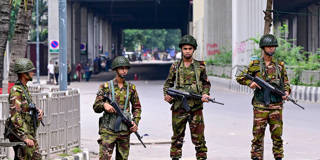Regime change brought about by popular uprisings rarely leads to democratic breakthroughs. Yet Western powers have often supported coups and takeovers – regardless of the new regime's democratic credentials – in order to advance their own geopolitical and economic interests.
NEW DELHI – With great-power rivalries again at the center of international relations, democratic governments have been relying on secret statecraft to shape or sway regimes in weaker states, including by supporting or aiding regime change. Far from advancing democracy globally, these efforts are exacerbating its vulnerabilities at a time when authoritarianism is on the rise.

NEW DELHI – With great-power rivalries again at the center of international relations, democratic governments have been relying on secret statecraft to shape or sway regimes in weaker states, including by supporting or aiding regime change. Far from advancing democracy globally, these efforts are exacerbating its vulnerabilities at a time when authoritarianism is on the rise.